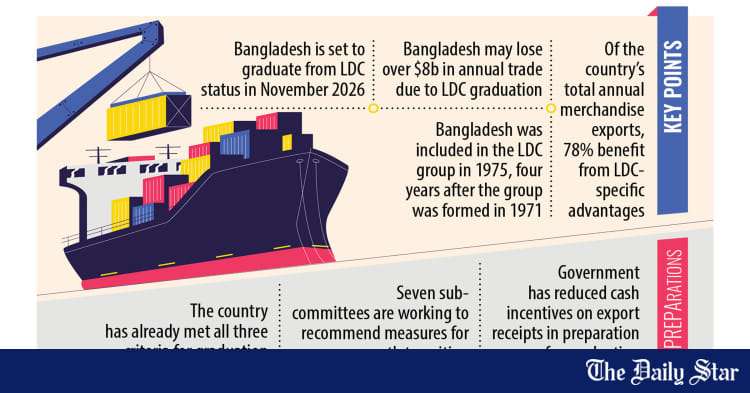Deferring LDC graduation not an option
Economist says
Deferment of Bangladesh's country status graduation should not be even up for discussion as inclusion in the least developed country category is voluntary while upgrading to the developing country grouping is mandatory, said a noted economist yesterday.
Many are arguing in favour of the deferment, but the smart move for the country would be to start taking preparations for a smooth transition, said Mustafizur Rahman, distinguished fellow of the Centre for Policy Dialogue (CPD).
He was addressing a discussion on "Restoring stability in economic and political landscape" at an 8th SANEM Economists' Conference 2025 organised by the South Asian Network on Economic Modeling (SANEM) at BRAC Centre Inn in Dhaka.
No other peer country is demanding a deferment and while a country needs to meet two out of three criteria to be eligible for the graduation, Bangladesh has qualified in all three, said Rahman.
Even Nepal, which is scheduled to graduate with Bangladesh in November 2026, is not demanding a deferment,
he said.
Leaders of different countries attending the ministerial conference of World Trade Organization (WTO) in Abu Dhabi last year did not show interest in extending the transition period, he said.
Bhutan has already graduated and if Bangladesh defers the graduation, it will be left with war-torn Afghanistan as the only two least developed countries (LDCs) in South Asia, said Rahman.
After the graduation, Bangladesh will become ineligible for almost all trade benefits, such as zero duty access, and strictly abide by the Trade Related Aspects of Intellectual Property Rights (TRIPs), said Rahman.
Moreover, Bangladeshi exporters will face duties of over 10 percent in many countries, he said.
However, some countries such as those under the European Union, Canada and the UK will continue to provide the facilities for a grace period of three years, he said.
Yet many businesses want the government to provide export incentives till the end of the grace period in 2029, he said.
Seven sub-committees are working on providing recommendations to the government for a smooth graduation, said Rahman.
Of the total losses of advantages that the 12 graduating LDC are enjoying now, nearly 90 percent will befall Bangladesh as it avails the highest trade benefits among all the LDCs, he said.
While Bangladesh requested the United Nation for inclusion in the LDC group in 1972, Zimbabwe, which was then struggling, refused to accept the LDC status, Rahman said.
He suggested increasing direct tax collections, as there was a possibility of a fall in revenue from indirect taxes in the form of import duties.
Bangladesh should also focus more on countries in the Global South, South East and the Association of Southeast Asian Nations (Asean) as only 11 percent of its annual exports are destined for those countries, he said.
China imports $2,800 billion worth of goods and India over $730 billion in a year. But Bangladesh accounts for less than one percent of China's imports while exports to India stand at less than $2 billion, said Rahman.
Bangladesh should also hold negotiations for signing free trade agreements, comprehensive economic partnership agreements and other trade deals for retaining the preferential trade benefits, he said.
While Bangladesh will face duties following the graduation, Vietnam will enjoy zero-duty in many countries as it has already signed trade deals, he said.
On a positive note, Bangladesh and Japan are currently engaged in the process of signing an economic partnership agreement, the economist said.
Bangladesh should focus on avoiding anything that threatens economic stability. For instance, one mega project with an original allocation of Tk 1,800 crore had ended up costing Tk 18,000 crore, he said.
Moreover, Bangladesh will have to pay $6 billion annually in debt repayments from 2026 when the grace period for the largest project on loan, the $14 billion Rooppur nuclear power plant project, will come to an end, he said.
Nearly, 77 percent of illicit financial outflow was through trade such as mispricing—over invoicing and under invoicing. But the fact remains that trade related mispricing is a major issue, and it has to be addressed, he said.
Zahid Hussain, former lead economist of World Bank's Dhaka office, said Bangladesh was already in the middle-income trap.
The export to GDP ratio and investment are declining, but inflation is rising. The volume of bank loan rescheduling is also increasing while the central bank's foreign currency reserves are at a low level, Hussain said.
The discontinuation of a loan programme by International Monetary Fund (IMF) for Bangladesh will have consequences, he said.
It will affect budgetary support provided by World Bank to Bangladesh, he said.
Moreover, Asian Development Bank, Asian Infrastructure Investment Bank and others will ask about the challenges of Bangladesh, he said.
KAS Murshid, former director general of the Bangladesh Institute of Development Studies, said in order to attain macroeconomic stability, Bangladesh really needs to lay emphasis on agriculture as it ensures the smooth flow of essentials.
Sharmind Neelormi, a professor at the Department of Economics at Jahangirnagar University, pointed out that environmental assessments were not conducted for the construction of a 29.73-kilometre road through hoars in Kishoreganj and for Savar Tannery Industrial Estate in Dhaka.
Rumana Haque, a professor of economics at the University of Dhaka, said investment in the health sector needs to be increased to ensure a productive workforce.
At the same time, the reasons need to be unearthed on why the health sector cannot spend the money allocated in the national budget, although there is a chronic shortage of health personnel, she said.
Moreover, the situation is dire when it comes to treating mental health patients, she added.
Selim Raihan, executive director of the SANEM, moderated the discussion.

.png) www.inven.ai
www.inven.ai













































